#How technology is used to improve our health
Text
HIV and COVID
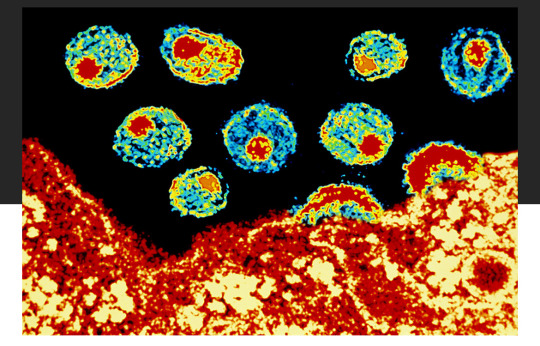
A major barrier to preventing the spread of HIV is accurate test results.
There is a high chance there are many people with HIV that have it and do not know. We do not know how long this undetected time period is (lentiviruses are often associated with long periods of time of virus activity that goes undetected- 5 to 10 years or more), but there is a chance many individuals with HIV go undiagnosed for many years. Individuals during this time before an HIV diagnosis complain of fatigue and many undiagnosed disabling symptoms during that time period. HIV is able to cause changes to immune cells that prevent HIV tests from finding the infection. Some people get negative HIV tests when they are HIV positive. This means you could be HIV negative, but still have HIV in your blood and can spread HIV to other individuals.
Getting a COVID vaccination (and sometimes other vaccinations like the flu vaccination) can help the body identify HIV hiding in the body. This allows earlier treatment and intervention. Once HIV has been identified, it also reduces the risk for all individuals in our population to be exposed to more severe infections.
Getting tested regularly for HIV used to be part of our federal public health recommendations.
This just further emphasizes why this information is so important to know and healthcare needs to start testing for more diseases in more people and do these tests more often.
People often assume their infection came from an unfaithful partner, but in reality HIV has been spreading unknowingly to many in the medical community and still in the public sphere no one is talking about it like the huge deal it is.
This potential means people could be raped as a child, never have sex again, never encounter drugs, and then be miserable & living with an active HIV infection into their early 20s and they would never know. Once they got a positive test result they would have no idea where the infection even came from.
Our entire understanding of these types of diseases has to change and the seriousness of this topic has to be addressed by the world. This was theorized as a mechanism of HIV spread due to how many people were getting diagnosed but had no identifiable cause of their HIV, but now it’s proven and right in front of us. This is disastrous.
To everyone that told the truth about how they didn’t know how they got these types of diseases & how they had no idea where they got it from then faced judgement from others and even the medical community- you aren’t crazy.
On behalf of everything these types of diseases did to destroy families, relationships, and your body, I’m going to apologize right now for all the individuals that I know won’t ever give you an apology for what they did and what they said.
I believe you. I always did.
Without you telling your truth , we never would have been able to figure this out about HIV.
HIV is spreading in “HIV negative” individuals to other individuals as some researchers theorized.
The mRNA vaccination technology developed is now the foundation for the next generation of HIV treatment and disease control. We must continue to push and advocate for improving the lives of all people with disease and we all just took a huge step forward.
You do not have to be sexually active to develop HIV. Your sexual trauma doesn’t have to define your life for the rest of your life- you are stronger than you know and braver than you feel.
Find a place to get tested for HIV here:
I still recommend getting a NAT or “viral load” test done as the first test to see if you have HIV.
I think considering what we know about HIV and in consideration of all the things we still don’t know that this is the safest option. Any other test for this condition available today has too high of a chance of producing a wrong result. I find it extremely uncomfortable we still use the other types of tests in the hospital and doctor office settings.
If you choose to order a test through an online service be aware some tests only tell you about either HIV-1 or HIV-2 and will not always provide you information related to type 1 and type 2.
For example, here:
This will provide you information related to ordering a test that looks for both types of HIV instead of just one strain of HIV.
Stay safe.
#hiv#virus#sick#chronically ill#chronic pain#chronic illness#chronic fatigue#pain#doctor#medicine#viral
505 notes
·
View notes
Text
How technology is used to improve your health?

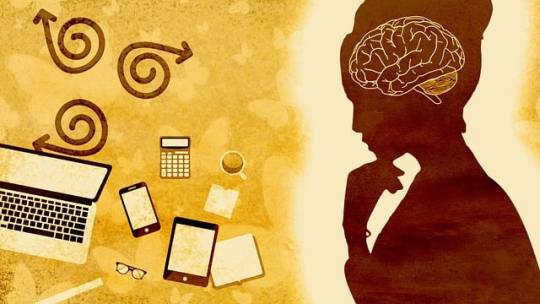

#technology#How technology is used to improve our health#How technology is used#technology is used#Technology is used through Telemedicine#Electronic Health Records (EHRs)#Technology is used through Medical apps#Fitness trackers and wearable devices#medical technology#medical#health#health technology
1 note
·
View note
Text
Good News - July 22-28
Like these weekly compilations? Tip me at $kaybarr1735 or check out my new(ly repurposed) Patreon!
1. Four new cheetah cubs born in Saudi Arabia after 40 years of extinction

“[T]he discovery of mummified cheetahs in caves […] which ranged in age from 4,000 to as recent as 120 years, proved that the animals […] once called [Saudi Arabia] home. The realisation kick-started the country’s Cheetah Conservation Program to bring back the cats to their historic Arabian range. […] Dr Mohammed Qurban, CEO of the NCW, said: […] “This motivates us to continue our efforts to restore and reintroduce cheetahs, guided by an integrated strategy designed in accordance with best international practices.””
2. In sub-Saharan Africa, ‘forgotten’ foods could boost climate resilience, nutrition

“[A study published in PNAS] examined “forgotten” crops that may help make sub-Saharan food systems more resilient, and more nutritious, as climate change makes it harder to grow [current staple crops.] [… The study identified 138 indigenous] food crops that were “relatively underresearched, underutilized, or underpromoted in an African context,” but which have the nutrient content and growing stability to support healthy diets and local economies in the region. […] In Eswatini, van Zonneveld and the World Vegetable Center are working with schools to introduce hardy, underutilized vegetables to their gardens, which have typically only grown beans and maize.”
3. Here's how $4 billion in government money is being spent to reduce climate pollution

“[New Orleans was awarded] nearly $50 million to help pay for installing solar on low to middle income homes [… and] plans to green up underserved areas with trees and build out its lackluster bike lane system to provide an alternative to cars. […] In Utah, $75 million will fund several measures from expanding electric vehicles to reducing methane emissions from oil and gas production. [… A] coalition of states led by North Carolina will look to store carbon in lands used for agriculture as well as natural places like wetlands, with more than $400 million. [… This funding is] “providing investments in communities, new jobs, cost savings for everyday Americans, improved air quality, … better health outcomes.””
4. From doom scrolling to hope scrolling: this week’s big Democratic vibe shift

“[Democrats] have been on an emotional rollercoaster for the past few weeks: from grim determination as Biden fought to hang on to his push for a second term, to outright exuberance after he stepped aside and Harris launched her campaign. […] In less than a week, the Harris campaign raised record-breaking sums and signed up more than 100,000 new volunteers[….] This honeymoon phase will end, said Democratic strategist Guy Cecil, warning the election will be a close race, despite this newfound exuberance in his party. [… But v]oters are saying they are excited to vote for Harris and not just against Trump. That’s new.”
5. Biodegradable luminescent polymers show promise for reducing electronic waste

“[A team of scientists discovered that a certain] chemical enables the recycling of [luminescent polymers] while maintaining high light-emitting functions. […] At the end of life, this new polymer can be degraded under either mild acidic conditions (near the pH of stomach acid) or relatively low heat treatment (> 410 F). The resulting materials can be isolated and remade into new materials for future applications. […] The researchers predict this new polymer can be applied to existing technologies, such as displays and medical imaging, and enable new applications […] such as cell phones and computer screens with continued testing.”
6. World’s Biggest Dam Removal Project to Open 420 Miles of Salmon Habitat this Fall

“Reconnecting the river will help salmon and steelhead populations survive a warming climate and [natural disasters….] In the long term, dam removal will significantly improve water quality in the Klamath. “Algae problems in the reservoirs behind the dams were so bad that the water was dangerous for contact […] and not drinkable,” says Fluvial Geomorphologist Brian Cluer. [… The project] will begin to reverse decades of habitat degradation, allow threatened salmon species to be resilient in the face of climate change, and restore tribal connections to their traditional food source.”
7. Biden-Harris Administration Awards $45.1 Million to Expand Mental Health and Substance Use Services Across the Lifespan
““Be it fostering wellness in young people, caring for the unhoused, facilitating treatment and more, this funding directly supports the needs of our neighbors,” said HHS Secretary Xavier Becerra. [The funding also supports] recovery and reentry services to adults in the criminal justice system who have a substance use disorder[… and clinics which] serve anyone who asks for help for mental health or substance use, regardless of their ability to pay.”
8. The World’s Rarest Crow Will Soon Fly Free on Maui

“[… In] the latest attempt to establish a wild crow population, biologists will investigate if this species can thrive on Maui, an island where it may have never lived before. Translocations outside of a species’ known historical range are rare in conservation work, but for a bird on the brink of extinction, it’s a necessary experiment: Scientists believe the crows will be safer from predators in a new locale—a main reason that past reintroduction attempts failed. […] As the release date approaches, the crows have already undergone extensive preparation for life in the wild. […] “We try to give them the respect that you would give if you were caring for someone’s elder.””
9. An optimist’s guide to the EV battery mining challenge
““Battery minerals have a tremendous benefit over oil, and that’s that you can reuse them.” [… T]he report’s authors found there’s evidence to suggest that [improvements in technology] and recycling have already helped limit demand for battery minerals in spite of this rapid growth — and that further improvements can reduce it even more. [… They] envision a scenario in which new mining for battery materials can basically stop by 2050, as battery recycling meets demand. In this fully realized circular battery economy, the world must extract a total of 125 million tons of battery minerals — a sum that, while hefty, is actually 17 times smaller than the oil currently harvested every year to fuel road transport.”
10. Peekaboo! A baby tree kangaroo debuts at the Bronx Zoo

“The tiny Matschie’s tree kangaroo […] was the third of its kind born at the Bronx Zoo since 2008. [… A] Bronx Zoo spokesperson said that the kangaroo's birth was significant for the network of zoos that aims to preserve genetic diversity among endangered animals. "It's a small population and because of that births are not very common," said Jessica Moody, curator of primates and small mammals at the Bronx Zoo[, …] adding that baby tree kangaroos are “possibly one of the cutest animals to have ever lived. They look like stuffed animals, it's amazing.””
July 15-21 news here | (all credit for images and written material can be found at the source linked; I don’t claim credit for anything but curating.)
#hopepunk#good news#cheetah#extinct species#africa#nutrition#food#farming#gardening#pollution#climate#climate change#climate crisis#democrats#us politics#us elections#kamala harris#voting#recycling#biodegradable#technology#salmon#habitat#fish#mental illness#mental health#substance abuse#hawaii#electric vehicles#zoo
819 notes
·
View notes
Text
book review: Stolen focus by Johann Hari
Major learnings from this book. It basically talks about focus, why and how we’re losing it. Why can’t we pay attention anymore? Are we individuals to blame or our systems?
There will be a time when the upper class will be extremely aware of the risks to their attention (caused by tech, social media, our current generation) and the masses, with fewer resources to resist the temptation of technology, will be manipulated more and more by their computers.
Multitasking is a myth. What actually happens when we multitask is that we “juggle” between tasks. This results in incomplete tasks, higher error rates, less focus, less creativity and memory decreases.
Sleep is extremely important, especially sleeping according to nature - when the sun sets and sun rises. If the whole world slept the way we are naturally programmed, we would have an economic earthquake. Our economic systems run on sleep deprived people.
Reading online and reading print has a huge difference. Reading online creates tendencies of skimming and scanning text. This prevents our brain from focusing intently on one story at a time, which print allows you to do. You also remember and understand things from printed texts better.
Empathy. Certain research suggests that reading fiction and novels improves empathy, because you are immersing yourself in another character’s life for a while. Empathy has played a huge role in human advancements. If a group of white people did not realise that colonisation was wrong, if men did not realise that women deserve equal rights, we would not have independent nations nor be close to gender equality today.
There are multiple types of paying attention. Focused attention is one thing. But day dreaming and letting your mind wander with no distraction (that is, being alone with your thoughts) is equally important. Some of the most important breakthroughs in human history were because the inventors were not actively focusing on solving the problem.
Being on social media = giving a free pass to be manipulated. No thoughts, opinions, desires that you have are original. They have all been fed into you by social media and the online world. It is by their design that we cannot focus.
Leaked internal records of Facebook show that they are aware that their algorithms exploit the human brain’s attraction to divisiveness. 64% of people, for instance, who join extremist groups join because FB’s algorithm directly recommends too. “Our recommendation systems grow the problem.” Zuckerberg eventually terminated the unit that was studying this.
Diet and attention. The diet we consumed today is a diet that causes regular energy spikes and energy crashes. Our food does not have the nutrients we need for our brains to function well. Our current diets actively contain chemicals that seem to act on our brains almost like drugs.
Be careful about reading research, especially when it’s funded by the industry itself. For 40 years, the lead industry funded all the scientific research into whether it was safe, and assured the world that it was. Lead later turned out to severely stunt your ability to focus and pay attention and that you are more likely to get ADHD.
We define success broadly as economic growth. Economies should get bigger, companies should get bigger. Growth can happen in two ways - either the companies find new markets or they persuade the existing consumers to consume more. If you can get people to eat more or to sleep less, you’ve found the source of economic growth. It results in people working overtime, not having enough time with family, friends and themselves, stress and anxiety prone, lack of sleep and bad health, etc.
Conclusion: use precommitment to stop switching tasks, try to focus more on intrinsic motivation than extrinsic, go off social media periodically (say 1 month at a time) and then extend those breaks; everyday spend 1 hour in walking in silence (no music, conversations or people- and if this is in nature, even better) to connect with yourself, 8 hours of sleep every night, build on slow practices like yoga, cut out processed food, take your PTO!!
#c suite#powerful woman#strong women#personal growth#that girl#getting your life together#balance#productivity#ceo aesthetic#Book review
292 notes
·
View notes
Text
To Ragh; or, On Fatness
Hi! Below is an actual play mini-essay. These are written as part of a personal writing practice of thinking critically about actual play. I hope you find this reading engaging and know that all I write reflects my own interpretations rather than as an official representation/canonization of these shows. Keep reading for my interpretation of Ragh Barkrock's fatness as part of queer representation in Dimension20.
Ragh Barkrock may be one of the most beloved NPCs in Dimension20. It would be easy for Ragh, a bloodrush player good enough to potentially play professionally, to be presented as hypermasculine. In fact, the freshmen year art for Ragh, when he was antagonist rather than beloved ally, showed him in a muscular, inverted Dorito shaped body typical of a jock.
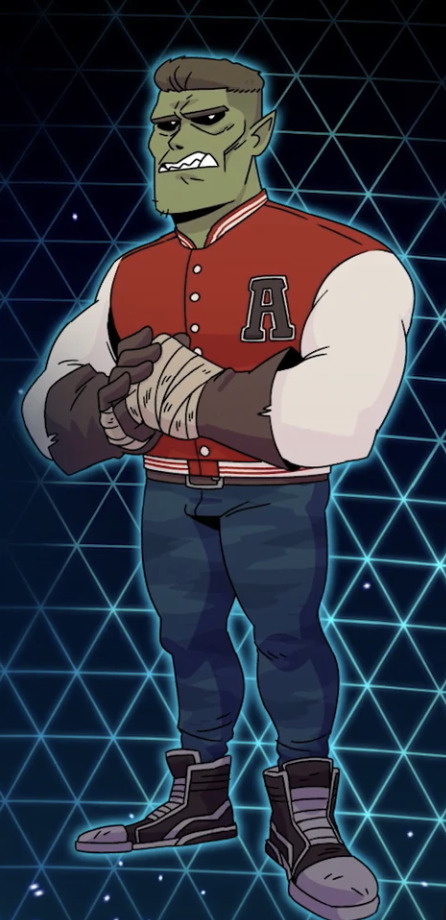
He's, obviously, built, and his cut jaw and cheekbones only bolster that image. As Ragh comes to terms with being gay at the end of Fantasy High, his countenance changes. When we see him again, the new art reflects a chubbier, happier Ragh.
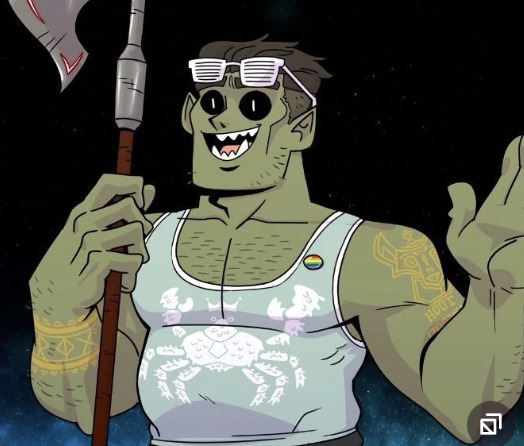
The show aligning weight gain with acceptance and happiness already works against prevailing stereotypes that use weight loss as a quick metaphor for improving yourself and being the "real you." Moreover, connecting Ragh's acceptance of his sexuality with what seems like a larger comfort in his own body is a strong indictment of hypermasculine gay culture. As Gabriel Arana writes, gay men "must reconcile their sense of masculinity with their failure to conform to its heterosexuality." Not doing so has negative mental health outcomes, as Arana points out, and contributes to a culture that devalues fat queer people (see the popular "no fats, no femmes, no Asians" that often is touted in masculine gay subculture).
All of this, I think, is why Ragh's art for Junior Year was particularly impactful for me as a fat queer person. If being a gay man (or half-Orc, in Ragh's case) means having to situate your life in relationship to failing compulsory masculinity, then it seems there is an inherent queer aspect to embracing, celebrating, and showcasing a beloved NPC in an explicitly fat and happy body.

FHJY Ragh art by @caitmayart
Ragh is still strong and he is still fat. His body radiates a commitment to the power of fat bodies to exist in spaces they are often violently unwelcome in, such as gyms. Existing in gyms and sports spaces as fat people means dealing the "impossible standard that rejects nearly all of us" and upholds a diet culture rooted in impossible, Eurocentric and colonial body standards. In TTRPGS or actual plays, there is a unique opportunity to think about how bodies might exist in worlds different from ours, to imagine bodyminds as otherwise. However, as queer critics like Paul Preciado have noted, sci-fi and fantasy representations of cyborgs and other transformative bodies often lean into "fixing" disabled people or moving gender nonconforming bodies more easily towards technologies upholding a normative standard rather than questioning the standard all together.
Spyre is a world that deals with similar issues to ours, even without direct one-to-one correlations, so it, too, is a place where the narrative and artistic choices should be examined in how it helps us interpolate the world the audience resides in. From the Applebees cultish adherence to a deity-based nationalism to the various representations of parental neglect and abuse and every side story in-between, Dimension20's flagship show does not shy away from difficult realities even when recasting them through fantasy. Ragh, as a half-orc gay son of a disabled single mother, then, I see the arc his fat body goes through as meaningful and intertwined with his self-acceptance and queerness. He moves away from the toxic masculinity engineered into his blood rush team to instead pursue coalition comraderie with his friends to the point that he and his mother end up joining a communal living situation with those friends and their parents. Ragh's body expands as his family does, as his ties to community do, and to me, the gift of his fatness is the invitation to expansion that it holds out to us as viewers.
#dimension 20#actual play#fantasy high: junior year#fhjy#fhjy spoilers#ragh barkrock#lydia barkrock#brennan lee mulligan#emily axford#lou wilson#zac oyama#siobhan thompson#ally beardsley#brian murphy#riz gukgak#kristen applebees#fabian seacaster#adaine abernant#gorgug thistlespring#figeroth faeth
257 notes
·
View notes
Text
It's a new age of motoring. The old world of inefficient, gas-burning, polluting vehicles is over, and now is the time for zingy cough drops that do 0-60 in four seconds and have a bunch of annoying dinging sounds that you can't figure out how to turn off. If you're the kind of person who rides on an elevator and thinks "this could use more JavaScript," the world is your oyster.
Of course, no matter how many touchscreens, gewgaws, doodads, and fart noises you throw at an electric car, someone still has to build the car. You could go to a boring, old-technology company that worries about things like "bolts that fit," or you could take a gamble. You could step into the future and invest in a Switch Motors platform for your next electric car.
Switch Motors is the only small, unproven brand you need to risk millions of dollars and the livelihood of your employees on. We know about making a reliable car, because we know everything about how to make an unreliable car. And like Thomas Edison said before he was deluged by telemarketers: goddammit, why doesn't this thing work? Here's an example of our focus. Switch Motors cars are guaranteed to have at least four wheels, or we'll provide you with a pro-rated discount.
Don't care about the "car" part of electric cars? We've got you covered, with several platforms based entirely on classic Malaise Era American cars. Customers will love the straight chrome bumpers, which are easy to bang back into shape when they have a little whoopsy-doo at highway speeds while trying to quit their Zoom call. And our powertrains are proven – they come from high-end Chinese electric forklifts that we source from only the finest AliExpress vendors. No Wish.com for you, oh no: we're premium all the way.
Paint? Friend, paint slows you down. Besides, it looks way cooler when the arcs the motors kick off are shooting across the skin of the car like a Jacob's ladder. Keeps carjackers away, too. And pigeons. And anyone with a pacemaker. Maybe we can do something to improve that last part, I've got some Toyota water pumps around here somewhere. Switch Health Solutions sounds pretty good.
135 notes
·
View notes
Text
WICHITA FALLS (KFDX/KJTL)— As technology continues to become more accessible around the world, it is becoming easier to see how it affects children and teens.
In an attempt to get a handle on the presence of technology in schools, Dr. Donny Lee and the WFISD are hoping that implementing a new cellphone policy can help reduce technology-related issues in the school district.
There are more child deaths from hot cars in Texas than anywhere else in the US
“Starting issues on social media, bullying other students during the day on social media,” Dr. Lee said. “So, we’ve noticed a whole host of issues, mainly beginning in the secondary levels at junior high and all the way through the high school.”
The new pilot program, set to begin at McNiel and Hirschi Middle Schools, will be implemented through a partnership with Yondr. At the beginning of each school day, students will place their phones in a Yondr pouch, which is locked with a magnetic lock. They can unlock the pouch at the end of the day. La Vega High School in Waco uses Yondr pouches, and within the first six months of using the pouches, student disengagement dropped from 20% to 8%. The number of disciplinary incidents dropped drastically as well.
Though La Vega High School and other schools around Texas showed generally positive results with Yondr, the approach has parents in Wichita Falls torn. Franklin Fokun has a child attending McNiel Middle School. He sees the pouches as a potential positive for the district.
“The phones are supposed to be controlled,” Fokun said. “They don’t have to go to class with them, so they have to keep them somewhere. Then after that, maybe during break you have access, and after that we’ll go back to class, keep it there. So, I think that’s a good idea.”
Jessica Weaver, a mother with a child attending Barwise Middle School, is less enthusiastic about the new policy.
“I don’t like the idea, not with all the school shootings and stuff like that,” Weaver said. “I want my kid to be able to get a hold of me if he needs to, or just even a mental health day. If he needs something, I want him to be able to reach me.”
Given some parents’ concerns, Dr. Lee said keeping students safe is still the highest priority for the WFISD. In the early stages of the policy, parents will have to put more trust in the hands of the district and its safety procedures.
“The safety of your kid is our top priority, but if there’s a thousand different messages going out in the event of a crisis, it’s going to be mass chaos and we’re not going to be able to address the issue,” Dr. Lee said.
If the policy shows improvements in discipline and classroom engagement at McNiel and Hirschi, Barwise Middle School will be the next WFISD school to partner with Yondr.
103 notes
·
View notes
Text
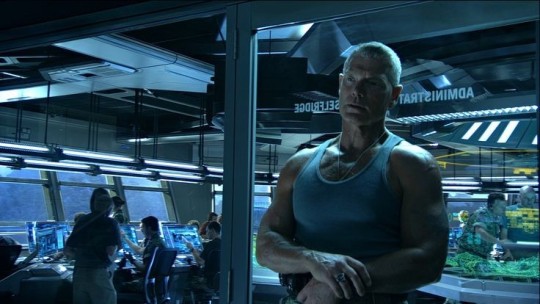
You licked your lips with nervousness as you sat on the helicopter with the new team you were assigned with.
They all had tattoos and weird haircuts. Looked as if they came out of prison. You didn't like their style.
You bowed your head and held on the box of science equipment.
The Colonel introduced you to his loyal team.
You felt puny around them.
Now here you were. You sat between Zdog and the Colonel.
You could smell his cologne sandalwood with shaving cream. You liked it.
You saw him staring at you. You gave him a smile smile then looked away
Quaritch inwardly smiled. You were so well mannered. He knew you were a good person.
He felt the butterflies in his stomach when you smiled at him. What a model you are.
His life improved a lot when you moved in with him and started "dating" or whatever.
You cooked food for him. The healthy quality of handmade food gave him better health.
Not the cafeteria crap
Not to mention the way you would clean his shared room with you. Less germs. No bugs.
With the clean laundry and all that. You were an asset.
He can imagine living with you.
And not to mention the sleeping patterns. He now sleeps easily. He cannot take medicine since he is a soldier. A rule. But now you are his pill. You relax him. Give him inner peace.
The helicopter landed and Quaritch held his hand out for you. He made you stand safely in the grass.
Off the helicopter. And that is where your beautiful eyes widened. It was a natural heaven. So healthy and fresh. No industrialization. Like a country life esthetic. You hate the city life
How cozy too
The colonel watched you amazed expression with love
You were indeed so cute
He let you wonder a little.
You gathered the plants Grace told you and the team would watch. Quaritch then heard something. He motioned his team to follow him.
He will not go too far or long away from you so he followed the noise. He refused to let you die. He knew he said he will not succeed in protecting all. But, you he will make a priority.
You were done with the gathering and that was when you noticed you were alone. You decided to roam around some more. The farther you went the more beautiful the forest was. Amazing.
You hated the over devolved earth with their technologies. The old days were better.
As you continued walking, you failed to realized your mistake
Quaritch came back and chased a mean looking jaguaruan (made up predator name. Haha.)
It got scared off. The team returned but found you gone.
Holy shit
Quaritch's heart beated like bat shit crazy
Did a monster take you?
"Scout ahead!"
"yes, sir!" His team shouted in unison.
Quaritch ran quickly. You poor thing. He left you alone. It was his fault. He overestimated you. You were not a soldier. He thought if he protected you from afar would be fair judgement but not close.
He scolded himself. He was a fool for putting you in danger. His sweet delicate Name.
You were to fragile to be left on your own
He then saw your sneaker prints and then there you were. Collecting weird goddamn flowers.
He realized that you walked away instead.
"brat!"
You jumped and saw your lover heaving. Uh oh.
He grabbed your hair. You hissed and clutched his hand to ease the pain.
"You almost gave me a fuckin heart attack. I told you not to go far. You deliberately disobeyed me."
"I'm sorry colonel I forgot."
The colonel dropped his gun and let go of you. He told the mic that his team should go next to the helicopter and wait for him and told them he found you.
Then sadly it rained. Pandora rain was always harsh. Muddy soup. Your clothes were already soak. The Colonel saw your wet clothes clinging to your curvy body and saw your nipples
Fuck. He couldn't take it
He pushed you to the grass ground and began to take off your clothes
"Colonel, what are you doing!?" You tried to stop his greedy hands from lifting your blouse.
"you need to be disciplined. Besides this place is the most romantic place for us to consume our relationship rather the fucking stuffy base "
That's right. The eclipsed moon. The rain. The fresh scenery and open air. Like Adam with his eve.
Fuck.
He first began to eat you out. Your pink and wet virgin pussy
Your eyes rolled back in pleasure.
This was really happening
The Colonel then began to suck your perky tits and then kiss your body and all that. He wanted you to feel cherished and he wanted to complete your fantasy like every romantic woman.
He never did this to any woman he slept with in the past. Just a way to get laid
You were nervous, he knew. He then kissed you as he Inserted himself in you. He hissed in pleasurable pain as he pumped in you.
You cried. He was too thick and too long. But he kissed your tears away and continued. The blood came out but was immediately washed away from rain
He spilled his seed in you and then he collapsed on the crook of your neck. He would get you pregnant but you waited a long time for this. So, he guesses he will have to let you have fun first before making you settle down with him.
He separated from you then watched you catch your breath
He felt remorse of him being harsh in yelling at you. But you almost killed yourself.
He sighed. He then made you sit up and he dressed you. Then himself. He held your hand and made you follow him.
The team was waiting and you arrived at the base.
When you two were finally alone in his room, Quaritch immediately stripped you out of your wet clothes. He then dried you. But instead of letting you sleep. He took you again . He was again rough. Like he was waiting for this his whole life. How long was he pining for you?
"look at me " he said sternly
You looked at him in surprise.
"don't disobey me again. It's for your own good."
"I'm sorry."
Again you were cute. So innocent and well mannered. He kissed you. What a princess.
He pumped hard into you. He wanted to fill you to the brim. Full of his seed. He licked your neck.
Finally after down, he made you sleep on his chest
The next morning. The Colonel was in a good mood. His soldiers noticed. Grace knew why. She was in a good mood too. She loved her plants.
Maybe Quaritch was not so bad after all. But boy you were wrong...
#yandere miles quaritch x reader#miles quaritch#dark miles quaritch#yandere miles quaritch#miles quaritch x reader#avatar 2009#avatar
132 notes
·
View notes
Text
Milton Orr looked across the rolling hills in northeast Tennessee. “I remember when we had over 1,000 dairy farms in this county. Now we have less than 40,” Orr, an agriculture adviser for Greene County, Tennessee, told me with a tinge of sadness.
That was six years ago. Today, only 14 dairy farms remain in Greene County, and there are only 125 dairy farms in all of Tennessee. Across the country, the dairy industry is seeing the same trend: In 1970, more than 648,000 US dairy farms milked cattle. By 2022, only 24,470 dairy farms were in operation.
While the number of dairy farms has fallen, the average herd size—the number of cows per farm—has been rising. Today, more than 60 percent of all milk production occurs on farms with more than 2,500 cows.
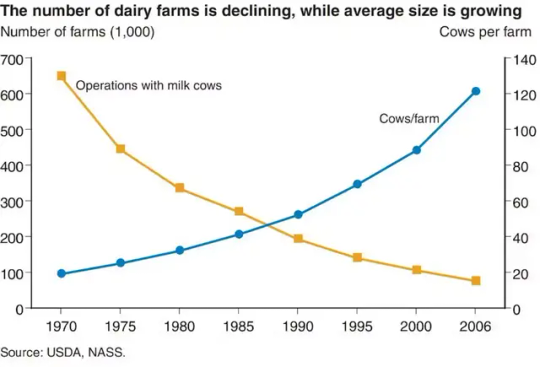
This massive consolidation in dairy farming has an impact on rural communities. It also makes it more difficult for consumers to know where their food comes from and how it’s produced.
As a dairy specialist at the University of Tennessee, I’m constantly asked: Why are dairies going out of business? Well, like our friends’ Facebook relationship status, it’s complicated.
The Problem with Pricing
The biggest complication is how dairy farmers are paid for the products they produce.
In 1937, the Federal Milk Marketing Orders, or FMMO, were established under the Agricultural Marketing Agreement Act. The purpose of these orders was to set a monthly, uniform minimum price for milk based on its end use and to ensure that farmers were paid accurately and in a timely manner.
Farmers were paid based on how the milk they harvested was used, and that’s still how it works today.
Does it become bottled milk? That’s Class 1 price. Yogurt? Class 2 price. Cheddar cheese? Class 3 price. Butter or powdered dry milk? Class 4. Traditionally, Class 1 receives the highest price.
There are 11 FMMOs that divide up the country. The Florida, Southeast, and Appalachian FMMOs focus heavily on Class 1, or bottled, milk. The other FMMOs, such as Upper Midwest and Pacific Northwest, have more manufactured products such as cheese and butter.
For the past several decades, farmers have generally received the minimum price. Improvements in milk quality, milk production, transportation, refrigeration, and processing all led to greater quantities of milk, greater shelf life, and greater access to products across the US. Growing supply reduced competition among processing plants and reduced overall prices.
Along with these improvements in production came increased costs of production, such as cattle feed, farm labor, veterinary care, fuel, and equipment costs.
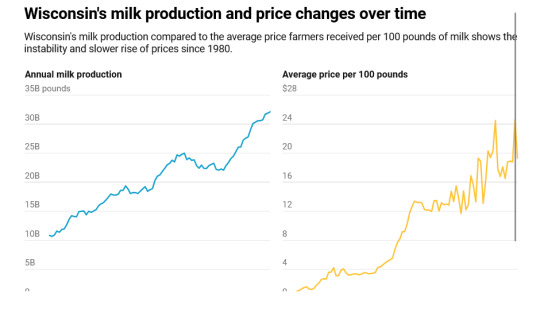
Researchers at the University of Tennessee in 2022 compared the price received for milk across regions against the primary costs of production: feed and labor. The results show why farms are struggling.
From 2005 to 2020, milk sales income per 100 pounds of milk produced ranged from $11.54 to $29.80, with an average price of $18.57. For that same period, the total costs to produce 100 pounds of milk ranged from $11.27 to $43.88, with an average cost of $25.80.
On average, that meant a single cow that produced 24,000 pounds of milk brought in about $4,457. Yet, it cost $6,192 to produce that milk, meaning a loss for the dairy farmer.
More efficient farms are able to reduce their costs of production by improving cow health, reproductive performance, and feed-to-milk conversion ratios. Larger farms or groups of farmers—cooperatives such as Dairy Farmers of America—may also be able to take advantage of forward contracting on grain and future milk prices. Investments in precision technologies such as robotic milking systems, rotary parlors, and wearable health and reproductive technologies can help reduce labor costs across farms.
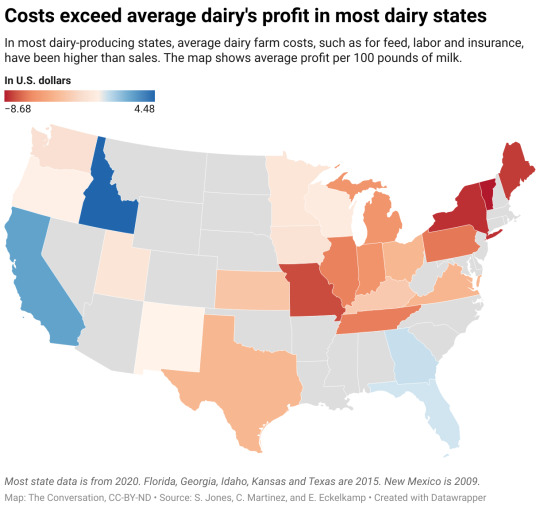
Regardless of size, surviving in the dairy industry takes passion, dedication, and careful business management.
Some regions have had greater losses than others, which largely ties back to how farmers are paid, meaning the classes of milk, and the rising costs of production in their area. There are some insurance and hedging programs that can help farmers offset high costs of production or unexpected drops in price. If farmers take advantage of them, data shows they can functions as a safety net, but they don’t fix the underlying problem of costs exceeding income.
Passing the Torch to Future Farmers
Why do some dairy farmers still persist, despite low milk prices and high costs of production?
For many farmers, the answer is because it is a family business and a part of their heritage. Ninety-seven percent of US dairy farms are family owned and operated.
Some have grown large to survive. For many others, transitioning to the next generation is a major hurdle.
The average age of all farmers in the 2022 Census of Agriculture was 58.1. Only 9 percent were considered “young farmers,” age 34 or younger. These trends are also reflected in the dairy world. Yet, only 53 percent of all producers said they were actively engaged in estate or succession planning, meaning they had at least identified a successor.
How to Help Family Dairy Farms Thrive
In theory, buying more dairy would drive up the market value of those products and influence the price producers receive for their milk. Society has actually done that. Dairy consumption has never been higher. But the way people consume dairy has changed.
Americans eat a lot, and I mean a lot, of cheese. We also consume a good amount of ice cream, yogurt, and butter, but not as much milk as we used to.
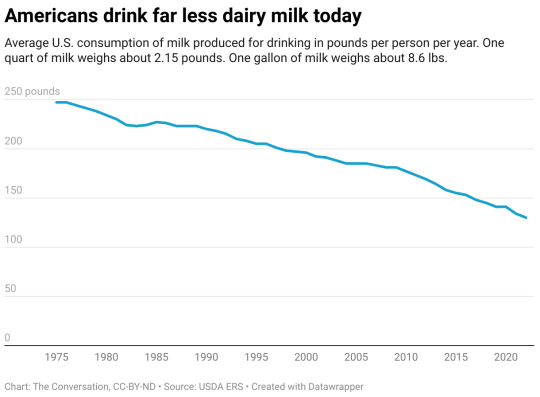
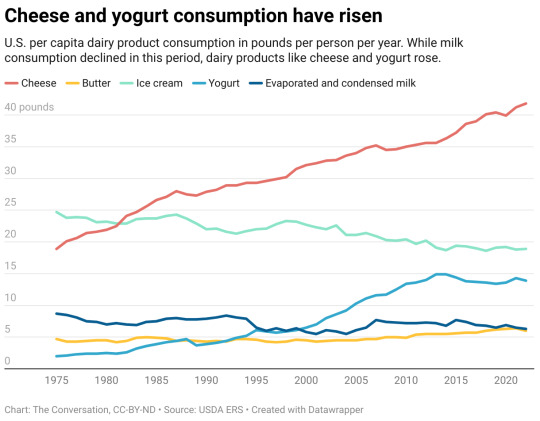
Does this mean the US should change the way milk is priced? Maybe.
The FMMO is currently undergoing reform, which may help stem the tide of dairy farmers exiting. The reform focuses on being more reflective of modern cows’ ability to produce greater fat and protein amounts; updating the cost support processors receive for cheese, butter, nonfat dry milk, and dried whey; and updating the way Class 1 is valued, among other changes. In theory, these changes would put milk pricing in line with the cost of production across the country.
The US Department of Agriculture is also providing support for four Dairy Business Innovation Initiatives to help dairy farmers find ways to keep their operations going for future generations through grants, research support, and technical assistance.
Another way to boost local dairies is to buy directly from a farmer. Value-added or farmstead dairy operations that make and sell milk and products such as cheese straight to customers have been growing. These operations come with financial risks for the farmer, however. Being responsible for milking, processing, and marketing your milk takes the already big job of milk production and adds two more jobs on top of it. And customers have to be financially able to pay a higher price for the product and be willing to travel to get it.
30 notes
·
View notes
Text
🍷 🍇 "Let Dionysus guide your hand, whether holding a brush or a keyboard, for he knows no fear. Through him, your creations will transcend the mundane and touch the infinite." 🍷 🍇
- John Karneios Auletta
Consider the myth of Dionysus and the invention of theater: in ancient Greece, Dionysus inspired the creation of drama and theater, a revolutionary form of storytelling that combined music, performance, and narrative in ways never seen before. This innovation transformed how stories were told and experienced, much like how modern technology can revolutionize our creative expressions. Just as Dionysus inspired the ancient Greeks to invent new forms of art, he can inspire your technological creations to transcend the ordinary and reach new heights of creativity and impact. Dionysus not once was worried about how humans would misuse theater. He didn't think about how people would steal old scripts from others original, no He created and appreciated theater no matter how others planned on using it!! We have to stop placing our own fears and limiting things all because we fear that someone else will steal it. The gods never fretted over how humans might misuse their newfound tools; they knew that human nature was beyond anyone's control. So, if the gods weren't concerned back then, why would they be worried about it now?
(Let’s be real—I'll give you a rundown of gifts the gods handed to humanity, gifts they bestowed without a second thought about how we'd misuse them. These divine blessings were celebrated, no matter how we twisted their purposes down the line. Think about it: almost every boon from the gods has been twisted and abused by us. Did that ever stop the gods from sharing their gifts? Did it ever hinder those gifts from propelling our society forward? Absolutely not. You believe Prometheus gave us fire, right? Then why doubt that Hephaestus didn’t spark the inspiration for tech advancements like AI?)
Fire: Prometheus gifted humanity fire, enabling cooking, warmth, and metalworking, without divine concern over its potential for destruction.
Agriculture: Demeter taught humans how to cultivate crops and harvest food, which revolutionized human society.
Medicine and Healing: Asclepius, the god of medicine, bestowed knowledge of healing and medicine to humans, improving their health and longevity.
Navigation and Astronomy: Poseidon and Urania, the muse of astronomy, provided humans with knowledge of the seas and the stars, enabling exploration and trade.
Music and Arts: Apollo and the Muses granted humans the arts of music, poetry, and dance, enriching human culture and expression.
Architecture, Technology and Building: Hephaestus, the god of blacksmiths and craftsmen, gifted humans with the knowledge of building and construction, leading to the creation of temples, cities, and infrastructure.
Metalworking: The Cyclopes and Hephaestus provided the skill of metalworking, enabling the creation of tools, weapons, and art.
Mathematics and Geometry: Athena, known for wisdom, imparted knowledge of mathematics and geometry, crucial for science and engineering.
Writing and Literature: Hermes, the messenger god, introduced the art of writing and communication, preserving knowledge and facilitating learning.
Weaving and Textiles: Athena also taught humans the craft of weaving, leading to the production of clothes and fabrics.
Agricultural Tools: Demeter provided tools like the plow, revolutionizing farming and food production.
Domestication of Animals: Various gods, including Artemis and Pan, facilitated the domestication of animals, aiding in farming, transportation, and companionship.
Pottery and Ceramics: Athena also gave humans the skill of pottery, essential for storage, cooking, and art.
Law and Justice: Themis and Dike, goddesses of justice, provided the concepts of law and order, crucial for societal structure.
Alchemy and Early Chemistry: Hermes Trismegistus, associated with Hermes, shared esoteric knowledge of alchemy, leading to early chemical practices.
Drama and Theater: Dionysus, god of theater, inspired the creation of drama, enhancing cultural and spiritual life.
Philosophy and Reasoning: Athena fostered the development of philosophy, encouraging critical thinking and ethical reasoning.
Calendar and Timekeeping: Urania and Chronos provided humans with methods to measure time, essential for agriculture, rituals, and navigation.
Medicine and Surgery: Asclepius and Apollo imparted advanced medical techniques, improving surgical practices and treatments.
Herbal Knowledge: Gaia and other nature deities shared knowledge of herbs and plants for medicinal and culinary uses.Music Instruments: Apollo and the Muses gave humans musical instruments like the lyre and flute, enriching their cultural life.
Sculpture and Statues: Hephaestus and Athena inspired the art of sculpture, leading to the creation of beautiful statues and monuments.
Language and Rhetoric: Hermes and Apollo contributed to the development of language and persuasive speaking, vital for communication and governance.
Maps and Cartography: Poseidon and the Muses provided knowledge of map-making, aiding in exploration and navigation.
Perfumes and Incense: Aphrodite and other deities shared the art of making perfumes and incense, enhancing rituals and personal adornment.
#dionysian#dionysus#dionysus devotte#pagan witch#pagan#paganism#hellenic pagan#art#hellenic polytheism#philosophical#ai generated#ai#ai art#ai artwork#ai artist
22 notes
·
View notes
Text
ASTRO BASICS #2: UNDERSTANDING WHAT THE ASCENDANT (RISING SIGN) REALLY IS
the ascendant is the window to your entire natal chart. it is the window in which the native "looks out" of to see the world and in which others "look in" to see the native.
it is the worldview, philosophy and chosen life map of the native, the ascendant is what your soul chose* for you to aid you in this lifetime so it is through the ascendant in which the natal chart operates.
in more grounded terms this means the ascendant affects the native's entire approach to life, what they think is the correct way to live and what they think is valuable in living a fulfilling life.
because the ascendant is our chosen life map it means the solar return ascendant is the main focus of a solar return - the sign your solar return ascendant is in shows what you will be forced to focus on throughout that year.
you will usually have a deeper understanding or appreciation of the sign the ascendant was in when you solar return ends, having learnt the lessons you needed to. often you will also meet someone important that has their sun or moon in the same sign as your solar return ascendant that affects you in some way (even if they're only in your life for that year), or you will suddenly begin dealing a lot more with someone of that sign.
while the ascendant is complex, you can find the main themes of the ascendant simply by looking at what house the sign rules:
aries - first house: the self - assertion and expression of the self, beginnings, habits.
taurus - second house: self-worth, money, earthly pleasures (food, sex, material belongings), comfort, luxury, security, five senses, habits and work ethic.
gemini - third house: thinking, opinions and communication, theory work, siblings and close friends, community and neighbours (what's "close” to you), early education, short trips.
cancer - fourth house: where we come from, early life that shaped us (what shapes us - emotional and psychological foundations), self-care, home, family, subjective thinking, comfort zone and comfort (coziness).
leo - fifth house: joy, hobbies, creativity, romance (courtship stage), fun, games, spontaneity, sex, children, self-expression, vacations, gambling, fashion, drama and theatrics.
virgo - sixth house: service to others (needing to feel useful), being served, health and disease, fitness, pets, work habits, daily routine, organisation, analytical thinking, co-workers, work environment, self-improvement, labour, enemies, sacrifice (“selflessness” house).
libra - seventh house: one-to-one relationships, attraction and repulsion, sharing, politics, blind spot (where we are self unaware).
scorpio - eighth house: intimacy and merging (including sex), other people's resources and shared money, death and transformation (rebirth), taboo, mystery (and deception), deep emotions.
sagittarius - ninth house: experience, expansiveness, higher education, religion and philosophy (continued learning and search for meaning - the need for something bigger than one's self), travel, wisdom, ethics, cross-cultural understanding.
capricorn - tenth house: career, achievement, longterm goals, purpose, public relations, public perception and social standing, reputation (needing a "brand" - what we want to be seen as), responsibility, authority figures.
aquarius - eleventh house: collective consciousness, groups, friends (acquaintances and networking), organisations, hopes, dreams, wishes, society and social awareness, technology and internet, humanitarianism, idealism.
pisces - twelfth house: dreams, unconscious, subconscious, spirituality, secrets, sacrifice, solitude, enemies, confinements, hidden things, self-undoing, confusion, karma, deep emotions, impressionability.
i recommend checking your previous solar return ascendant and asking yourself where life kept taking you and what you learnt, seeing how it relates to you - i believe this can help give you deeper understanding of the ascendant overall, both natal and solar return.
*even if you don't believe in life before earthly life or past lives, it is good to keep this in mind when considering how the ascendant works.
#astro basics#astrology#melody astrology#astro#astro observations#astroblr#ascendant#rising sign#aries#taurus#gemini#cancer#leo#virgo#libra#scorpio#sagittarius#capricorn#aquarius#pisces
252 notes
·
View notes
Text
How monopolized, industrialized, managerialist medicine is harming us and how we can remedy our ills.
Aaron Kheriaty, MD
Sep 11, 2024
Whether the influence of big pharma that profits from sickness, compromised public health agencies controlled by the very industries they are supposed to regulate, a biosecurity state that tends to jump from one declared health emergency to the next, medicine is now in danger of causing more sickness than it heals.
The year I was born, 1976, saw the publication if Ivan Illich’s prophetic book, Medical Nemesis, which opens with the startling claim, “The medical establishment has become a major threat to health.”[i] The book explores the epidemic of iatrogenic disease—that is, illnesses caused by medical interventions—which has only worsened in the nearly half century since this book was published. Most of the current research literature on iatrogenesis focuses on the problem of medical errors, and how to institute systems that can minimize errors. This is obviously important to address, but medical errors are only part of the story of how medicine is harming us.
Illich’s basic thesis was that some systems, including our healthcare system, improve outcomes only until they expand to a certain industrialized size, monopolized scope, and level of technological power. Once this threshold is reached, without intending to do so, these systems paradoxically cannot help but inflict harm and undermine their stated aims. Illich diagnosed “the disease of medical progress” in its early stages; I believe this disease has now reached its advanced stage. The problem is political and not merely professional: he argued that “the layman and not the physician has the potential perspective and effective power to stop the current iatrogenic epidemic.”[ii] Indeed, “among all our contemporary experts, physicians are those trained to the highest level of specialized incompetence for this urgently needed pursuit.”
8 notes
·
View notes
Text
Week 3 Blog 9/12
How do algorithms correlate to anti-black racism?
As discussed in Nicole Brown’s “Race and Technology” Youtube video, predictive policing technology has been used in the past decade to create strategic “hit-lists” to predict who would be most likely to commit or be involved with violent crimes in the area. These innocent civilians and children with no criminal past were on high surveillance in real life, as well as their data. Anything put into their algorithms would count as incriminating evidence. Sociologist Simone Brown’s book “Dark Matters” is briefly summarized through the video. It is noteworthy to acknowledge the racial and Black surveillance themes. As technologies continue to use bias and objectification against Black communities society must create and advocate for safe and inclusive spaces within the virtual world.
How has social media proven to encourage social justice and hate at the same time?
What immediately comes to my head is the BLM movement during 2020. After the unjust arrest and murder of George Floyd, uprisings in Black communities led to protests being broadcasted. With every scroll through social media and flip through news channels we were seemingly seeing the same content with different headlines and reactions. If we circle back, the death of George Floyd itself was unfortunately a trending topic with everyone’s biased opinions rather than a call of action for an act of abuse of power. Things such as his past criminal record were brought up through the media to justify what had happened to him, others used plain excuses such as his race. The Black Lives Matter movement had already gained traction years prior due to another murder of a young Black man. Black communities weren’t feeling heard or supported and the BLM movement was once again brought to headlines to advocate for Black voices and consequences to the police force. Now as this progressed and protests made way, lootings, attacks on protests, and curfews were put into place in many areas across the country. Depending on your algorithm you probably saw an array of discourse about the matter, so much so that it had taken away from the point of what was being advocated for in the first place. WIth the freedom of speech we have the right to voice our opinions on these heavy topics surrounding social justice, but society should practice proper and respectful netiquette so we use our voices with purpose.
How much does the healthcare system really depend on technology and how are people of color affected by this?
As society progresses, so do the systems within such as healthcare. Hospitals are actually quite dependent on technology as it is now considered an essential. Some technological advancements used in the healthcare system include data and analytics, diagnostic tools, telemedicine, and electronic health records. All sounds great so how would these pose as issues to people of color? With Electronic Health Records, hospitals are able to transfer patient data for improved treatment and coordination but when it comes to patients in areas with limited digital resources they are left with outdated medical treatment. “Racial bias in a medical algorithm favors white patients over sicker black patients” headlines The Washington Post as seen on Nicole Brown’s “Race and Technology” Youtube video. So yes, the use of data, algorithms, and technology has been proven to create a progressive era for healthcare and its patients, but we as a society must be aware of how this affects minority communities due to embedded bias and properly advocate for change.
Is AI ruining the future of students?
As students are distanced from pencils and paper and moved onto digital spaces, there is a lack of creativity and critical thinking within the entire generation of students. Students are able to use Grammarly and ChatGPT to write papers. Students are able to use Photomath and Mathway to complete math problems. Students are limited to a keyboard and screen for discussions and are missing raw interactions and conversations. This is a danger to the future workforce as many students are cheating their way through schooling and depending on hands on experience without book knowledge and human networking. Many are afraid of AI becoming the future of everything and that can only happen if we continue this co-dependent relationship with it.
https://www.youtube.com/watch?v=d8uiAjigKy8
Automating Inequality Intro (Eubanks)
Rethinking Cyberfeminism (Daniels
8 notes
·
View notes
Text
Pornography creators, law enforcement, parents and the public asked for views as government investigates impact of pornography
views to be collected on impact of emerging tech, such as AI and virtual reality, on pornography
results will inform independent Pornography Review that will cover harm caused to sexual relationships and violence against women in wider society
Law enforcers, pornography makers, parents and the public are being asked to help shape the future of pornography regulation in the UK from today (Thursday 11 January) as the government launches a wide-ranging call for evidence as part of its review of the pornography industry.
The questionnaire, which closes on Thursday 7 March will collect evidence on the impact of pornographic content on relationships, sexual behaviours, mental health and people’s views of women and girls.
This exercise will provide independent Lead Reviewer Baroness Bertin with evidence that represents the views of those in the industry itself and the public, which will be used to develop recommendations for the government to undertake.
The substantial impact that new technologies have had on the pornography industry will also be covered, with respondents asked for their thoughts on how AI and virtual reality have changed how pornography is made, accessed and viewed, as well as how this impacts viewers and the industry.
Law enforcement and the criminal justice system will have an opportunity to raise what challenges face them in identifying and tackling these issues in pornography – as well as giving the industry an opportunity to set out what it is doing to tackle them more effectively.
Lead Reviewer Baroness Bertin said:
Throughout this review, it is essential we engage directly with those who are most involved in the pornography industry and accurately establish what the general public thinks of the current rules governing pornography.
We want to hear from a wide range of views, whether it be a worried parent, those enforcing the laws to stop exploitation or someone directing or performing in pornography themselves, to speak up and support our review.
Extreme pornography can have a damaging impact - we owe it to our children and indeed to the whole of society to put the guard rails back in place.
This review will help us fully understand what we must now do to protect those most affected as well as future proofing the law to keep pace with an ever-evolving pornography industry.
Minister for Tech and the Digital Economy Saqib Bhatti said:
The Pornography Review will be key to informing what we do next to tackle any harmful impact the industry may have on those working within it, or society at large.
The invaluable evidence the public, experts and industry provide will be integral to what Baroness Bertin recommends later this year.
Ian Critchley, QPM, National Police Chiefs’ Council lead for Child Abuse and Investigation said:
I very much welcome this government commissioned review led by Baroness Bertin. It is one that is essential in tackling harmful sexual behaviours. This is in addition to the whole scale use of smart devices by teenagers and now under 10s, which gives them increased access to harmful material including violent pornography and indecent images of children.
The Online Safety Act is one of the most important pieces of legislation for a generation and it will help us to improve the safety of children and young people. In tandem with this review will provide a greater evidence base allowing us to better understand the impact violent pornography is having on the behaviour of young people and adults who continue to pose the greatest risk of harm to children. It will then ensure we can work together across agencies to prevent what has become normalised behaviour which is causing some of the greatest harm often with lifelong consequences.
The Pornography Review, announced last year, builds on the government’s work to take the long-term decisions for a better future for our children and grandchildren through the Online Safety Act, by stopping children from accessing pornography online by requiring services to establish the age of their users, including through age verification and age estimation tools.
Read the pornography regulation, legislation and enforcement call for evidence here.
22 notes
·
View notes
Text
H.R.H. Prince Daniel's opening speech at the European Renal Association's congress
Ladies and gentlemen,
It is a great honour for me to welcome you to Sweden, to Stockholm, and to the 61st ERA Congress.
From the early days of dialysis to the groundbreaking innovations in transplantation, you have continuously pushed the boundaries of what is possible.
However, as we celebrate your achievements, we must also recognise the ongoing challenges we face. The prevalence of chronic kidney disease (CKD) continues to rise globally, affecting millions of people and adding to the enormous burden on healthcare systems.
In developing countries, the situation is particularly critical, with many patients lacking access to life-saving treatments. This inequity underscores the urgent need for continued efforts in research, education, and policy advocacy.
The theme of this year's congress, "Innovate, Collaborate, Transform", reflects a collective mission to not only advance scientific knowledge, but also to implement practical solutions that improve patient outcomes.
Over the next few days, we will hear from leading experts who will share the latest research findings, clinical practices, and technological innovations.
A key focus area this year is the role of personalised medicine in kidney care. By tailoring treatments to the individual needs of patients, we can increase the efficacy and reduce side effects, ultimately leading to better outcomes.
This approach, combined with progress in AI and data analytics, holds the promise of revolutionising how we diagnose, treat, and manage kidney diseases.
We must also address the environmental factors impacting kidney health.
Climate change, pollution, and water scarcity are emerging as significant contributors to the global burden of kidney disease. And of course, a healthy lifestyle is crucial!
Ladies and gentlemen,
This year marks 60 years since the first kidney transplantation took place in Sweden, at a hospital called Serafimerlasarettet here in Stockholm. The surgery was performed by Professor Curt Franksson, who grew up in a small municipality two hours north of Stockholm, Ockelbo.
And so did I, but 50 years later.
Our shared history, Professor Franksson’s and mine, does not end there.
Forty-five years after Franksson's first transplantation at Serafimerlasarettet, I found myself at the same hospital, on dialysis, waiting for a kidney transplant.
Today, 15 years later, I am standing here, healthy, and happy with my father's kidney.
The gratitude I feel towards those of you who dedicate your lives to improving opportunities for us patients is indescribable.
Thank you.
Speech held by H.R.H. Prince Daniel at Stockholmsmässan, Älvsjö, Stockholm, on May 23, 2024.
7 notes
·
View notes
Text
Details on the SAG-AFTRA negotiations
Wanted to share from the SAG website what exactly it is that negotiations were like, what was proposed and what exactly this fight is about
Performers need minimum earnings to simply keep up with inflation.
Us: We need an 11% general wage increase in year 1 so our members can recover from record inflation during the previous contract term.
Them: The most we will give you is 5%, even though that means your 2023 earnings will effectively be a significant pay cut due to inflation and it is likely you will still be working for less than your 2020 wages in 2026.
Performers need the protection of our images and performances to prevent replacement of human performances by artificial intelligence technology.
Us: Here’s a comprehensive set of provisions to grant informed consent and fair compensation when a “digital replica” is made or our performance is changed using AI.
Them: We want to be able to scan a background performer’s image, pay them for a half a day’s labor, and then use an individual’s likeness for any purpose forever without their consent. We also want to be able to make changes to principal performers’ dialogue, and even create new scenes, without informed consent. And we want to be able to use someone’s images, likenesses, and performances to train new generative AI systems without consent or compensation.
Performers need qualified hair and makeup professionals as well as equipment to safely and effectively style a variety of hair textures/styles and skin tones.
Us: How about consultations with qualified hair and makeup professionals for all performers on set to ensure equity for performers of color, and a requirement to have the proper tools and equipment?
Them: Begrudgingly, we will do this for principal performers, but background actors are on their own.
Performers need compensation to reflect the value we bring to the streamers who profit from our labor.
Us: Consider this comprehensive plan for actors to participate in streaming revenue, since the current business model has eroded our residuals income.
Them: No.
All performers need support from our employers to keep our health and retirement funds sustainable.
Us: Contribution caps haven’t been raised in 40 years, imperiling our pension and health plans. Would you consider raising the caps to adjust for inflation and ensure that all performers, regardless of age or location, receive equal contributions?
Them: Here are some nominal increases nowhere near the level of inflation that won’t adequately fund your health plan. Also, background child performers under 14 years of age living in the N.Y. zone don’t deserve pension contributions, which is why we haven’t paid them since 1992.
Principal performers need to be able to work during hiatus and not be held captive by employers.
Us: These timelines we’ve proposed help series regulars by limiting the increasingly long breaks between seasons and giving them some certainty as to when they'll start work again or will be released.
Them: Take these select few improvements that will only help a select few.
Principal performers need to be reimbursed for relocation expenses when they’re employed away from home.
Us: Drop the ruse that series regulars are becoming residents of a new state or country when they go on location and adequately pay them for all of their relocation costs.
Them: Here’s some stipends which don’t realistically reflect the cost of relocating to an out-of-state or out-of-country production.
(A chart with a full breakdown here)
This was particularly heinous

30 notes
·
View notes